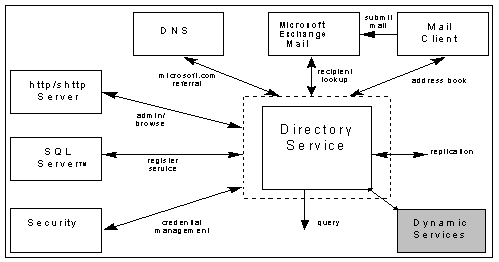
In addition to handling the traditional administrative tasks of the directory services, next generation Windows NT Directory Services will satisfy a wide variety of naming, query, administrative, registration, and resolution needs. The following diagram summarizes its overall function in the system.

Figure 1: The directory is a service provider.
The next generation Directory Services use a tightly integrated set of APIs and protocols to extend its services across multiple name spaces, dealing with directory information and resources that reside on different operating systems, and, across the Internet/intranet, at distant locations. Microsoft today provides a rich set of interoperability components for Novell NetWare 3.x/4.x customers. As protocols evolve, Microsoft works with the industry to standardize. Microsoft also makes a significant investment to ensure earlier releases of Windows NT interoperate with later releases.
The architecture of next generation Windows NT Directory Services allows them to scale from the smallest of businesses to enterprises supporting international corporations and entire government departments and services.
The following sections provide a closer look at the implementation of this next generation Directory Services.
Supporting Standard Name Formats
Users and applications are both concerned with naming in directory services. When you want to find something, or use something, you need to know the name or some property of the object you are searching for that you can use to collect a list of names. There are several common forms for names in directories, defined by both formal and de facto standards. The next generation Windows NT Directory Services support many name formats to accommodate both users and applications. Support for diverse name formats and access protocols makes next generation
Windows NT Directory Services readily available to users and applications in a form they are already familiar with. Some of these formats are as follows: